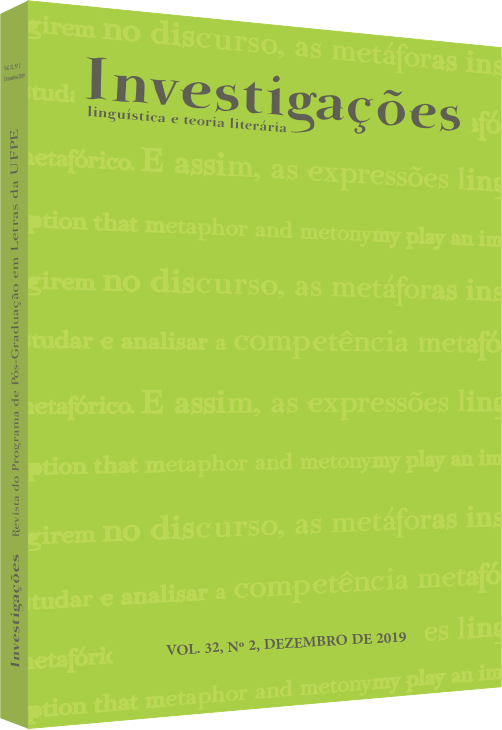“Fasten your seat belts”: Investigating learners’ perceptions regarding the implementation of tasks in an English online course
DOI:
https://doi.org/10.51359/2175-294x.2019.241326Abstract
Considering the growth of distance education, this qualitative study investigated learners’ perceptions of the implementation of traveling-themed tasks (ELLIS, 2003) in a virtual course of English as a foreign language. The course was offered to university staff members for a semester. Four participants took part in it. Instruments were a consent form, two questionnaires, and a Skype interview. Results suggest learners perceived the course as motivating, noticing their task engagement from the perspective of “l’education integrale” (LONG, 2015) and “learning by doing”. Furthermore, learning was related to cultural aspects noticed, interesting sites, and the connection with previous traveling experiences.
Riferimenti bibliografici
APPEL, C.; BORGES, F. Task design for L2 oral practice in audioblogs. The EUROCALL Review, 20.1, Proceedings of the Eurocall Conference 2011. University of Nottingham, 31st August – 3rd September, 2011.
BYGATE, M., SKEHAN, P.; SWAIN, M. Researching pedagogic tasks: Second language learning, teaching and testing. London: Longman, 2001.
COHEN, L., MANION, L.; MORRISON, K. Research methods in education. 5th ed. New York: Routledge, 2005.
CAPES. Universidade Aberta do Brasil. Disponível em: . Acesso em: 16 de Abril de 2018.
D’ELY, R. C. F.; TAVARES, M. G. G. Introduction: L2 learning/teaching and technology: a ‘CALL’ for a change? Ilha do Desterro, 66, Florianópolis, jan/jul, p. 009-018, 2014.
ELLIS, Rod. Task-based language learning and teaching. Oxford: Oxford University Press, 2003.
GOMES, Helton Simões. Pela 1ª vez, acesso à internet chega a 50% das casas no Brasil, diz pesquisa. Disponível em: <http://g1.globo.com/tecnologia/noticia/2015/09/pela-1-vez-acesso-internet-chega-50-das-casas-no-brasil-diz-pesquisa.html>. Acesso em: 16 de Abril de 2018.
GONZÁLEZ-LLORET, Marta. Designing task-based CALL to promote interaction: en busca de esmeraldas. Language Learning & Technology, 7.1, p. 86-104, 2003.
GONZÁLEZ-LLORET, M.; ORTEGA, L. Technology-mediated TBLT: Researching technology and tasks. John Benjamins, 2014.
LONG, Michael. Focus on Form in Task-Based Language Teaching. McGraw-Hill Companies: USA. p. 1-11, 1997.
———. Second Language Acquisition and Task-Based Language Teaching. Oxford: Wiley-Blackwell, 2015.
LYS, Francizka. The development of advanced learner oral proficiency using ipads. Language Learning & Technology, 17 (3), p. 94-116, 2013.
PAYNE, J. S.; WHITNEY, P. J. Developing second language oral proficiency through synchronous computer-mediated communication: output, working memory and interlanguage development. CALICO Journal, 20 (1), p. 07-32, 2002.
SALBEGO, N. N.; TUMOLO, C. H. S. Skype classes: Teachers’ and students’ perceptions on synchronous online classes in relation to face-to-face teaching and learning. International Journal of Language and Applied Linguistics, 1 (3), p. 36-45, 2015.
SILVA, M. Constructing the teaching process from inside out: how preservice teachers make sense of their perceptions of the teaching of the 4 skills. Unpublished Master Thesis. Universidade Federal de Santa Catarina, Florianópolis, 2004.
SKEHAN, Peter. A framework for the implementation of task-based instruction. In Branden, K. V. d.; Bygate, M.; Norris, J. (eds), Task-based language teaching: a reader (pp. 83-107). Amsterdam/Philadelphia: John Benjamins Publishing Company, 2009.
THOMAS, M.; REINDERS, H. (Eds.). Task-based language learning and teaching with technology. New York: Continuum Publisher, 2010.
TUMOLO, Celso. H. S. Ensino à distância: horizontes para o ensino de línguas estrangeiras. Fragmentos, 30, p. 25-34, 2006.
WANG, S.; VASQUEZ, C. Web 2.0 and second language learning : what does research tell us? CALICO Journal, 29 (3), p. 412-430, 2012.
YANGUAS, Inigo. Oral computer-mediated interaction between L2 learners: it’s about time! Language Learning & Technology, 14 (3), 72-93, 2010.
———. Task-based oral computer-mediated communication and L2 vocabulary acquisition. CALICO Journal, 29 (3), p. 507-531, 2012.
YUAN, Lin. A case study of non-English majors’ performance in Speak2Me virtual learning environment. Theory and Practice in Language Studies, 4 (2), p. 395-402, 2014.
Downloads
Pubblicato
Come citare
Fascicolo
Sezione
Licenza
Copyright (c) 2019 Juliane Regina Trevisol, Leonardo da Silva, Raquel Carolina Ferraz D'Ely

TQuesto lavoro è fornito con la licenza Creative Commons Attribuzione 4.0 Internazionale.
Autores que publicam na Revista Investigações concordam com os seguintes termos:
Autores mantêm os direitos autorais e concedem à revista o direito de primeira publicação, com o trabalho simultaneamente licenciado sob a licença Creative Commons Atribuição 4.0 Internacional (CC BY 4.0) que permite o compartilhamento do trabalho com reconhecimento da autoria e publicação inicial nesta revista.
Autores têm autorização para assumir contratos adicionais separadamente, para distribuição não-exclusiva da versão do trabalho publicada nesta revista (exemplo: depositar em repositório institucional ou publicar como capítulo de livro), com reconhecimento de autoria e publicação inicial nesta revista.
Qualquer usuário tem direito de:
Compartilhar — copiar e redistribuir o material em qualquer suporte ou formato para qualquer fim, mesmo que comercial.
Adaptar — remixar, transformar e criar a partir do material para qualquer fim, mesmo que comercial.
O licenciante não pode revogar estes direitos desde que você respeite os termos da licença.
De acordo com os termos seguintes:
Atribuição — Você deve dar o crédito apropriado, prover um link para a licença e indicar se mudanças foram feitas. Você deve fazê-lo em qualquer circunstância razoável, mas de nenhuma maneira que sugira que o licenciante apoia você ou o seu uso.
Sem restrições adicionais — Você não pode aplicar termos jurídicos ou medidas de caráter tecnológico que restrinjam legalmente outros de fazerem algo que a licença permita.

